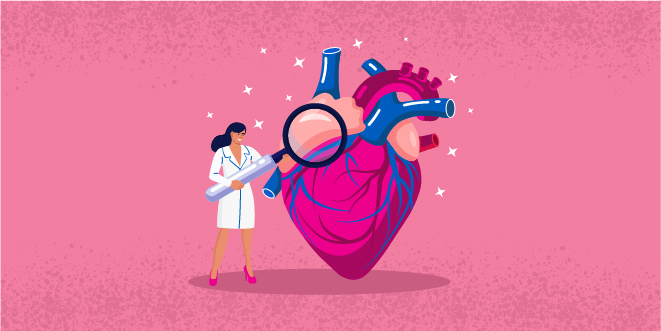Can Birth Control Give You a Stroke?

Ask any female young millennial or older Gen Z about birth control, and there’s a good chance that they were put on it at a young age. Many were put on it for reasons other than preventing pregnancy like to help with acne or to regulate periods.
It’s incredible that it’s become so accessible and gives people more autonomy over their bodies and reproductive choices, and has revolutionized the lives of people with uteruses.
Unfortunately, birth control can also come with quite a few side effects. More and more people have become aware of the repercussions that can come with the long-term (and sometimes short-term) use of birth control.
There are more common side effects like weight gain, loss of libido, sore breasts, and spotting in between periods, but some side effects are less obvious. Like the issue of covering up symptoms of a reproductive health disorder instead of getting to the root of it, or the toll that it can take on your liver.
Another serious complication that may be associated with birth control use is an increased risk of stroke. Does birth control really cause strokes? What steps can you take to have autonomy over your reproductive rights without the risk of a scary complication like a stroke?
What is A Stroke?
A stroke is when a blood vessel in the brain bursts, or when something blocks the blood supply to part of the brain. Brain cells start to die within minutes of being deprived of oxygen, causing parts of the brain to become damaged or die. Strokes can lead to long-term disability or brain damage, and can be fatal in some cases.
There are three different types of strokes:
- Hemorrhagic stroke: Occurs when an artery in the brain ruptures or leaks blood, putting pressure on brain cells and damaging them.
- Ischemic stroke: The most common type of stroke, this is when blood clots or another particle block blood vessels to the brain.
- Transient ischemic attack (TIA): Or a “mini-stroke”, is when blood flow to the brain is blocked for a short period of time, typically 5 minutes or less.
Symptoms of a stroke include:
- Confusion
- Trouble speaking or understanding speech
- Difficulty seeing in one or both eyes
- Numbness or weakness in the arm, leg, or face
- Severe headache without a known cause
- Dizziness or difficulty with balance
- Difficulty walking
All this information can sound scary, and new, especially for younger people who you normally wouldn’t think of being at risk of having a stroke.
Birth Control and Strokes
So can birth control really cause strokes? Potentially. One study showed people taking oral contraception have a stroke risk of 8.5 per 100,000 versus 4.4 per 100,000 for menstruating people not on hormonal birth control.
Before examining the relationship between strokes and birth control, it’s important to understand what different types of birth control are available. Hormonal birth control uses artificial hormones to suppress ovulation and prevent conception. Progestin-only pills are sometimes called “mini pills” and typically cause fewer side effects, however, they may not be as effective. Combination pills use both estrogen and progestin and tend to be more effective, although some people are more sensitive to estrogen.
Older studies spanning from 1960-1999 showed an increased risk of stroke of 2.75% among people who were on estrogen birth control. The same studies showed no increased risk of stroke for people taking progestin-only pills.
Later studies spanning from 1980 to 2002 showed a lower risk of a 2.12% increase of stroke for people taking combination hormonal birth control. A more recent study from 1995-2009 examined the risk of stroke among people taking birth control containing estrogen including vaginal rings and contraceptive patches. This study found no significant increased risk of stroke.
Other Risk Factors
The risk of having a stroke while on hormonal birth control is significantly higher for people who have other risk factors like smoking, high blood pressure, and who are on higher doses of estrogen. Although overall the risk is low, if birth control does contribute to a stroke it is typically an ischemic stroke.
Another risk factor that can significantly increase someone’s risk of having a stroke is migraines. People who have migraines with auras have a higher risk of having strokes than people who don’t get auras. However, people on combination hormonal birth control who get migraines, with or without aura, have an even higher risk.
Strokes and Birth Control: What to Remember
Although there is some correlation between taking hormonal birth control and strokes, overall the risk is low and seems to be declining over time. Part of this may be due to people smoking less which is also a significant risk factor for strokes.
Hormonal birth control offers people more autonomy and choice over their reproductive rights, but it does come with potential risks and side effects. If you’re unsure about what the right choice is for you, be sure to talk to your healthcare provider about your birth control options.
If you or someone you know is experiencing possible symptoms of a stroke, it’s vital to call emergency medical support immediately. It’s also important to note the time when symptoms first appeared as this can help medical providers determine treatment. Long-term outcomes for people who have had a stroke are dependent on how fast they are able to get medical care.

Natasha (she/her) is a full-spectrum doula and health+wellness copywriter. Her work focuses on deconstructing the shame, stigma, and barriers people carry around birth, sex, health, and beyond, to help people navigate through their lives with more education and empowerment. You can connect with Natasha on IG @natasha.s.weiss.


